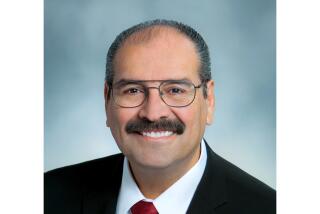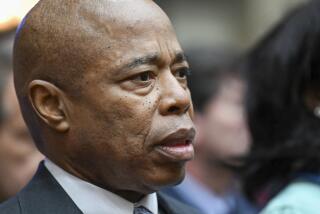Rape cases roil Caribbean island nation
- Share via
KINGSTOWN, ST. VINCENT AND THE GRENADINES — Rape allegations against Prime Minister Ralph Gonsalves have divided this idyllic archipelago beloved by honeymooners, mariners and hikers, with one side decrying what it sees as a culture of indifference toward sexual violence and the other insisting that the charges are politically motivated.
A member of Gonsalves’ security detail has told police that the 61-year-old leader raped her Jan. 3 at his Old Montrose mansion, where she was on patrol, stifling her protests and warning her to be quiet because his wife and children were upstairs sleeping.
Gonsalves has denied the accusation, and the district attorney, the prime minister’s former law colleague, has dismissed the complaint lodged in Magistrates Court by Constable Michele Andrews. She turned to the court because her police superiors had declined to pursue criminal action against Gonsalves.
Human rights activists and local business leaders allege that Gonsalves has a history of sexual aggression, and women’s advocates across the Caribbean have begun organizing support for Andrews, 36, whose identity was disclosed by Gonsalves.
At least four other women claiming to have been sexually assaulted by Gonsalves have come forward since Andrews made her accusation.
The scandal has shed light on political, legal and security networks in the region’s fledgling democracies, where loyalties to old school chums and political allies can, critics say, trump the rule of law.
Emery Robertson, one of the four local lawyers who have taken up Andrews’ case, says the Caribbean judicial system is lacking in sufficient checks on power. In St. Vincent, for instance, the prime minister also heads the ministries of finance, national security, economic planning and legal affairs, with the civil servants in each beholden to him and his party for their jobs.
“All the stakeholders owe some allegiance to the prime minister,” said Sharon Morris-Cummings, another of Andrews’ lawyers.
The four lawyers have appealed the dismissal of her case and a second one brought to a regional court by a Canadian alleging another attack. They vow to take the cases, if necessary, to the London Privy Council, which remains the court of last resort for the former British colony.
Human rights and feminist groups have demanded that Gonsalves be prosecuted to send a signal that no one is above the law.
“People are afraid to come forward. The message he’s sending is, ‘We will discredit you,’ ” said Peggy Antrobus, a Vincentian living in Barbados who for decades has been at the fore of the Caribbean’s tiny women’s movement.
Canadian’s complaint
Margaret Parsons, a Canadian human rights lawyer of Vincentian descent, charged in her complaint against Gonsalves that she was attacked in January 2003 when she had an appointment with him to discuss plans for constitutional reform in the region. A few minutes into their discussion, she says, he lunged at her, groped her, ripped her blouse and attempted to rape her on his office couch before she was able to break away and flee.
“I remember coming out of the building with my heart pumping. I was enraged. I couldn’t believe this happened to me,” Parsons recalled in a telephone interview from Toronto. “I didn’t know who to turn to. I didn’t know who would listen to me.”
She returned to Canada, and says she “suffered in silence” -- until Andrews’ case shamed and emboldened her to file a complaint in Magistrates Court.
“This is a prime minister, for Pete’s sake! He can’t continue to act with impunity in such egregious acts,” Parsons said. “We’re not talking about a parking ticket or a traffic violation; we’re talking about the violation of women’s bodies.”
As happened to Andrews’ case, Parsons’ complaint was taken over by the director of public prosecutions, R. Colin Williams, a longtime friend of Gonsalves who discontinued the proceedings, a power granted the district attorney-like office but rarely used on such serious allegations.
Williams is a tall, high-spirited man with a thunderous laugh. He defended his decisions to halt the cases against Gonsalves.
“Ralph is a victim of his personality. He has a very informal style,” Williams said. “Here they call him Huggingson Kissinger, because he’ll greet you with a hug and a kiss.”
He said the five incidents to which women have sworn statements were either old or unsubstantiated by physical evidence.
Andrews did not submit a written statement when she told the police superintendent about the alleged attack on the morning of the incident, nor when she contacted the police commissioner the next day, he said. Andrews says that both told her to go home and calm down, and that she was assured they would investigate and contact her when they needed information.
To the allegations of a 43-year-old woman who testified that she was raped by Gonsalves when she was an 18-year-old job applicant at his office, Williams bellowed with amusement, “That was more than 20 years ago, man!”
As for Parsons’ complaint, Williams said it couldn’t be trusted because “she’s a human rights lawyer!”
Court order nullified
Andrews, who is now walking a beat along the colonial edifices around Kingstown Harbor, said she wanted to kill herself in the days after the attack. She recalled tearfully the hours that she spent cowering in a police station bunk after flushing her underwear down a toilet and showering for half an hour, before deciding to turn to her police superiors.
Hearing nothing from them in four weeks despite further appeals, Andrews registered a private criminal complaint in the Magistrates Court on Jan. 31, and an order was issued for Gonsalves to appear three weeks later. The order was nullified when Williams intervened four days later.
Within hours of the filing, Police Commissioner Keith Miller informed Andrews’ attorneys that he had “had the matter investigated and those investigations did not reveal any evidence of wrongdoing by the honorable prime minister.”
Premier responds
Gonsalves appeared at a news conference the next day to declare his innocence and accuse political opponents of trying to force him to resign.
“This is an attempt to damage me politically and to discredit me in the eyes of the people,” Gonsalves said, with his wife, Eloise, and Cabinet officials at his side.
He proclaimed himself “cleared” by Miller and identified Andrews as his accuser, setting off weeks of public badgering of the policewoman during the daily radio call-in show hosted by Gonsalves’ press secretary, Hans King.
“I will not be bulldozed by unfounded allegations of which I am wholly innocent,” he said, adding that he was contemplating legal action against Andrews and her lawyers.
Gonsalves hasn’t commented on Parsons’ more recent complaint or on Williams’ April 4 decision to dismiss it. But one of the prime minister’s lawyers, Grahame Bollers, deemed her claims “criminal libel” in demanding an apology and $500,000 in compensation from Nice Radio, which aired an interview with Parsons three times in late April.
Lawyer Kay Bacchus-Browne, who is representing the radio station’s director as well as Gonsalves’ accusers, informed Bollers that they were rejecting the demands because Parsons’ words “are true.”
Inquiries from The Times were referred to another of the prime minister’s lawyers, Parnell Campbell, who did not return phone calls. Police officials did not respond to requests for interviews.
Letters to the editors of local papers and the Caribbean Net News agency have denounced the legal maneuvering to shield Gonsalves from prosecution and reminded readers that all citizens are supposed to be equal before the law. The island’s politically attuned calypso artists have also weighed in on the scandal with a derisive ballad titled “Hip, Hip, Who Rape?”
“We’ve noticed a number of worrisome incidents in which the rule of law seems to be in doubt,” said a U.S. diplomat, speaking on condition of anonymity, who paid a visit here in April to inquire about the cases.
The Eastern Caribbean Supreme Court, which has been asked to review Williams’ actions, is expected to rule soon and could endorse the dismissals or send the cases to trial.
That court is composed of justices appointed by the prime ministers of participating states, and attorney Bacchus-Browne said she had “a little vestige of hope” that the regional court would put politics aside and send the cases to trial. Although if that happens, she said, Gonsalves probably would appeal.
“It’s probably going to have to go to the Privy Council if we’re to see justice,” she said.
--
More to Read
Sign up for Essential California
The most important California stories and recommendations in your inbox every morning.
You may occasionally receive promotional content from the Los Angeles Times.














